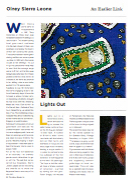Olney Sierra Leone When Sierra Leone came to independence in 1961 Tony Ockenden, an Olney man, was forwarded to assist with setting up a national bank. This meant tutoring local government nominees into the task ahead of them and eventually overseeing the launch of their own currency the Leone. The country had been working with sterl i ng and the new currency was launched in 1 965 with the Leone valued at ten shillings. To put things into perspective it may help to recall that the average wage earner in Britain at that time was taking home rather less than fifteen pounds so ten bob was not to be sneezed at, we were accustomed to ten shilling notes where today we look for a fifty pence piece. Needless to say Mr Ockenden had some engaging tales to tell from those early days. A favourite followed a prime minister who, on becoming a Catholic, brought his four wives with him. Attending Mass and Holy Communion at the Sacred Heart Cathedral ny found himself lining up behind this L line of five, The Archbishop simply accepted that, all four ladies having An Earlier Link borne infants before conversion, things must be left to stand. Subsequently longyearsofcorrupt government, civil wars and the Liberian invasion have driven the Leone on a slippery path. I was out there ten years ago and the Leone was down to about 4,500 to the pound. Recently hoping to learn of improvement I was dismayed to hear that today's rate is down to around 7,000. For all the near non-existence of an economy the ordinary people remain determined to get on with life. 'Tis said that money cannot buy happiness, Sierra Leone's people are so welcoming and cheerful as to show that happiness has an economy of its very own. 66 Phonebox Magazine Lights Out ights out i s a nationwide event, which will see the l ights across the nation turned out for an hour on the 4th August, between 10 and 11pm. A number of Britain's most iconic landmarks will dramatically turn out their l ights, and members of the public are encouraged to do the same, leaving a single candle lit in order to commemorate the outbreak of the first world war, which happened at this time 1 00 years ago. The hope is that the nation will have a 'shared moment of reflection', signified by turning out the lights. wer Bridge, the Houses of Parliament, the National Theatre and Manchester's Old Trafford ground are just a few of the iconic buildings signed up to take part. The event has been inspired by the words spoken by Sir Edward Grey, Foreign Secretary in August 1914: "The lamps are going out all over Europe, we shall not see them lit again in our lifetime" Organisations and individuals alike are being urged to take part in this hour of reflection, and many community groups are organising candlelit gatherings at local war memorials. There will also be a candlelit vigil of prayer, readings and music, held at WestminsterAbbey.
